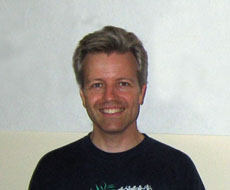The Team
David Humm | CRISM Instrument Scientist

Where
did you grow up?
In Iowa City—a small city and home of the University of Iowa.
How
did you get interested in space exploration?
Partly due to the manned moon missions and from reading science fiction. I was 5 years old when Neil Armstrong walked on the moon, and I watched the launches on TV from 1969-1972.
What's
your educational background?
At the age of 15, I left high school (without a diploma) to enter a program at the University of Iowa where I spent the next 4 years earning a Bachelor's Degree in both physics and astronomy. I received a Master's Degree and Ph.D. in physics from the University of Illinois.
What
are your hobbies?
Worldwide travel, reading (science fiction, technology, futurism), chess.
What's
your job on CRISM?
I'm responsible for making sure the CRISM instrument measures what the scientists really want to measure.
What
excites you about exploring Mars?
- Because it's the most Earth-like planet, it's a good example for understanding Earth
- The possibility of finding life on Mars
- It's an opportunity to scout out where resources are and to learn about the planet - - I'm convinced that people will one day live on Mars
What
advice would you give to someone like you who wants to get involved in
space exploration?
To follow your own interest and what truly inspires you - to be successful in what you do, you have to enjoy the work itself. There are many types of work in space exploration, not just science and engineering. For example, space medicine, computer science and programming - even accounting and management. Read all you can about space, and find a space angle that correlates with what you're interested in.
